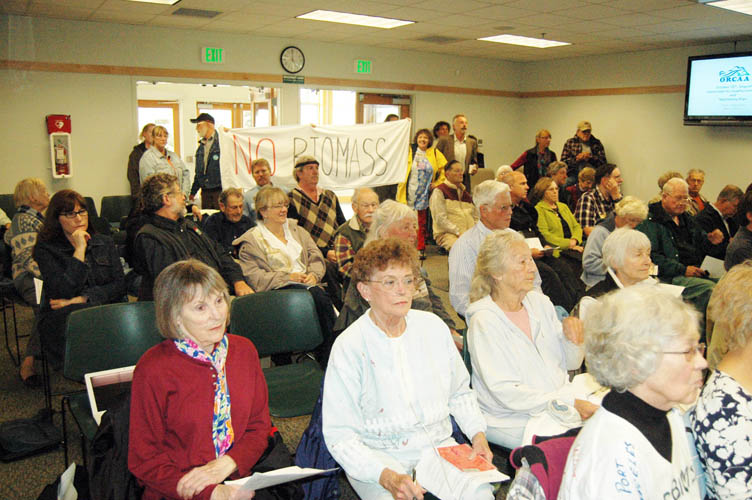SEQUIM — A plan to place four temporary air-quality monitors in Port Angeles and Sequim in 2013 and monitors in Port Townsend in 2014 doesn’t go far enough, according to many at a packed Olympic Region Clean Air Agency board meeting in Sequim.
Many among the more than two dozen Port Angeles, Sequim and Port Townsend residents who gave maximum-three-minute comments at the meeting Monday night were concerned about biomass expansion projects under construction in Port Angeles and Port Townsend.
Those speakers said they appreciated the plan to measure the diameter and quantity of particulate matter from 0.3 to 10 microns in the planned “saturation studies” of air pollution that would be facilitated by the temporary monitors, which are planned to operate for a year in Clallam County and for 10 months in Port Townsend.
But most of those who made comments at the meeting called for sharper measures than temporary air-quality monitors.
The particulate matter is created in large part by paper mills, diesel engines and wood-burning stoves that contain toxic substances, “pretty much any kind of combustion,” said Odelle Hadley, senior air-monitoring specialist with the Olympic Region Clean Air Agency, or ORCAA.
Current monitors measure particulates 2.5 microns and larger.
ORCAA, which regulates air quality in a six-county region that includes Clallam and Jefferson, will conduct yearly studies in its coverage area for the next six years.
Additional measures speakers called for included a moratorium on biomass cogeneration plants, which burn forest slash and other woody detritus to create energy — and which are being expanded at Nippon Paper Industries USA in Port Angeles in a $71 million project and at Port Townsend Paper Corp., a $55 million project.
No one in the audience spoke in support of the projects, and a few protesters held up a “No Biomass” banner at East Washington Street and North Sequim Avenue during a Clallam County Healthy Air Coalition rally a few blocks away from the meeting site before holding it up at the back of the meeting room before the public comment session began.
“Shut ‘er down, do the right thing,” yelled out one woman repeatedly as the session progressed.
“Do you know what our children will be breathing? Ban biomass,” was scrawled on another woman’s T-shirt.
“Ultrafine particulates — again, that are very damaging to human health — are defined as 0.1 microns and smaller,” said biomass project opponent Bob Lynette of Sequim.
Ultrafine particles “will not be counted by the proposed temporary monitors,” he said.
“While ORCAA’s proposed program is a step in the right direction, it will not answer the communities’ question: Are we being exposed to dangerous air emissions or not?” Lynette added.
ORCAA staff said not only that the agency lacks the authority to set a moratorium on biomass cogeneration plants, but also that Nippon’s and Port Townsend Paper’s projects have received necessary permits after surviving legal challenges, though Nippon still must obtain a permit for a cooling tower.
ORCAA said ultrafine particles of 0.01 to 0.1 microns are the same as nanoparticles and said they “contribute a negligible amount” to the mass concentrations that will be measured by the temporary monitors, according to the agency’s air-quality monitoring plan, available with other agency documents referred to at the meeting at http://tinyurl.com/9qe6t2v.
The four monitors, which are recommended for purchase at about $3,500 apiece by ORCAA Executive Director Fran McNair, are on track for approval by the ORCAA board at its 10 a.m. Nov. 14 meeting in Olympia.
Tentative plans call for their placement at Stevens Middle School, the Port Angeles Fire Department, Olympic Medical Center and Franklin Elementary School in Port Angeles; and at the Sequim High School-Sequim Middle School area or the Sequim Fire Department from January through December 2013.
Sites for Port Townsend air monitors have not been determined, but up to four monitors would be placed in that city from January 2014 through October 2014.
“We’re insisting on absolutely the best monitoring for our town, not temporary stopgaps that cannot and will not provide the information required,” Elaine Bailey of Port Townsend said.
“We deserve clean air.”
ORCAA intends to measure air quality before and after Nippon’s cogeneration boiler goes online in September 2013, Hadley said.
No objections to the purchase were raised by ORCAA board members, who include Port Angeles City Councilman Dan Di Guilio, Clallam County Commissioner Mike Doherty and ORCAA board Chairman and Jefferson County Commissioner Phil Johnson.
Nippon has been burning sludge, woody biomass and residual oil at its plant since 1953.
The Port Townsend facility also has been burning biomass.
The new Nippon plant will burn 95 percent woody biomass and about three times the amount of biomass currently burned to produce up to 20 megawatts.
The rest of the fuel will consist of de-watered sludge and some diesel, primarily for starting up the plant, the agency said.
Some at the meeting accused Nippon of “cherry-picking” facts contained in its permits that helped get the permits approved.
“They did not cherry-pick,” ORCAA professional engineer Mark Goodin said.
“They used the laws available to them.”
Those laws do not require the regulation of particulates smaller than 2.5 microns, Goodin said.
Particulates spewed by the boiler “will substantially decrease” compared with the present boiler, Goodin said.
The collection efficiency for ultrafine particulates, though not regulated, is expected to be 96 percent, he said.
Goodin said three control devices on Nippon’s boiler will scrub emissions of 2.5-micron particulates and smaller.
Emissions of sulphur dioxide will decrease, but there may be increases of carbon monoxide, nitrogen oxides, hydrogen chloride and volatile organic compounds.
“The control technology is capable of taking out all the particulates,” Goodin said.
But audience member Michael Bunnell of Sequim said there should be “zero harm” to public health.
“If you can’t afford now to protect us, then surely Nippon shouldn’t be allowed to continue building.”
Senior Staff Writer Paul Gottlieb can be reached at 360-452-2345, ext. 5060, or at paul.gottlieb@peninsuladailynews.com.

